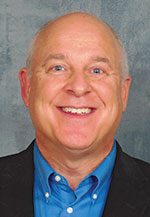Ken’s 12-Pack / Ken Ogorek
Things most Catholics wish they knew better: ‘Jesus loves you’

Third in a yearlong catechetical series
Folks who experienced religious education in the 1970s and 1980s often recall learning, “Jesus loves you.” These same folks will tell you, pretty often, they don’t recall learning much else.
In fairness, a lot was happening culturally during this time period, and efforts to teach more aspects of our Catholic faith were sometimes drowned out by political, economic and sexual revolution-related upheaval. Plus, knowing that Jesus loves you is really important!
Distant and unreal
Knowing who Jesus is always involves balancing his humanity with his divinity. When we overemphasize one of these more so than the other, we fall in to age-old heresies—misunderstandings that reared their heads early and often in the life of our holy, Catholic Church.
Religion textbooks in the late-1960s through early in the-1990s era, though, sometimes included a negative undertone in speaking of Christ’s divine nature, as if divinity is equated with being distant and unreal.
But disciples of Jesus know he’s very far from being aloof and uninterested in all our thoughts and feeling, our joys and sorrows, our triumphs and our crosses.
More than a teacher
Jesus is our Master Teacher. He’s our model, friend, brother and many more superlatives among all the brothers, friends, models and teachers we know.
Yet Jesus is also our Savior. In an unprecedented, unparalleled way, Jesus saves us from sin and death by his suffering, death and resurrection. Jesus is the one Savior of the world. When his divinity is insufficiently emphasized, the urgency of prioritizing our disciple relationship with him—lived in full communion with his holy, Catholic Church—can be lessened.
Everyone does not get a trophy
Being overly competitive has a downside. And participation trophies, alongside acknowledging excellent performance and achievement, can be valuable.
In the realm of faith guides, though, one teacher ultimately isn’t just as good as another; or more precisely, one Teacher is superior to all other preachers, philosophers and leaders.
Jesus truly is the one Savior of the world. He’s the grand finale of the Old Testament and the fulfillment of God’s plan for our salvation; he’s all this and more specifically because only Jesus is both fully human and fully divine.
The Incarnation miracle
The fact that the eternal Word of God takes on human flesh—becomes incarnate—is a miracle of God’s love. How can one person be both fully human and 100% divine?
A lack of clarity regarding the incarnation in the childhood religion textbooks of many Catholic adults has left some folks wondering whether it’s appropriate to mention Jesus in ways that imply he’s any better than the many religious leaders of human history.
In salvation history one person, both human and divine, stands above the rest.
Only Jesus predicted his own suffering, death and resurrection, and then rose from the dead gloriously and victoriously to be seen by hundreds before ascending to the Father.
Thankfully the Catechism of the Catholic Church and related resources help us balance our understanding of Christ’s divinity and humanity. When we grasp who Jesus is—as fully as we can on this side of heaven—we’re not only comfortable and confident in conversing about him, but also driven to prioritize our relationship with him, striving to fulfill the great commission that he gives us in the Gospel of Matthew: “Go, therefore, and make disciples of all nations … .” (Mt 28:19).
(Ken Ogorek, archdiocesan director of catechesis, has lost his six-pack
abs. But his 12-part series, whose theme is: Things Most Catholics
Wish They Knew Better, will run through December. He can be
reached at his archdiocesan e-mail address kogorek@archindy.org or
by using the contact information at
www.kenogorek.com.) †
